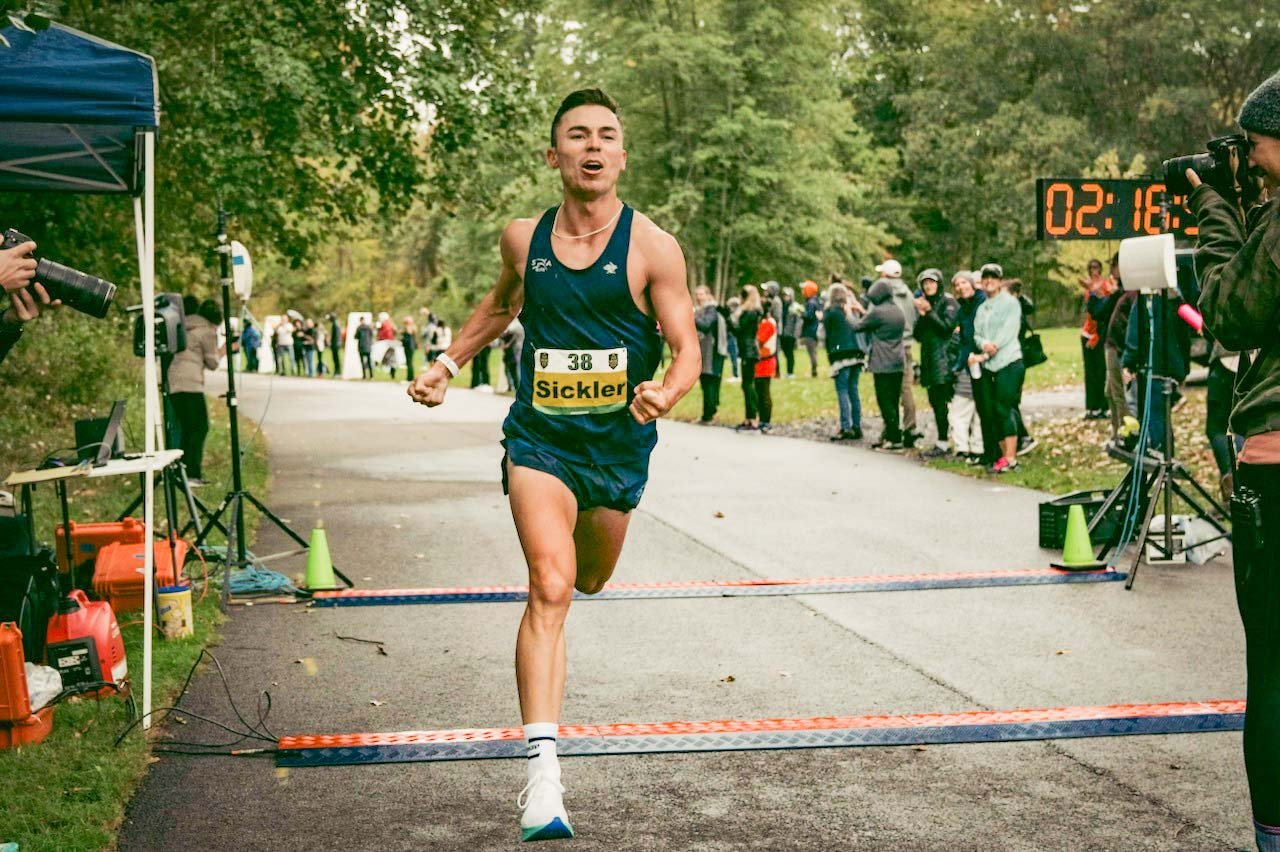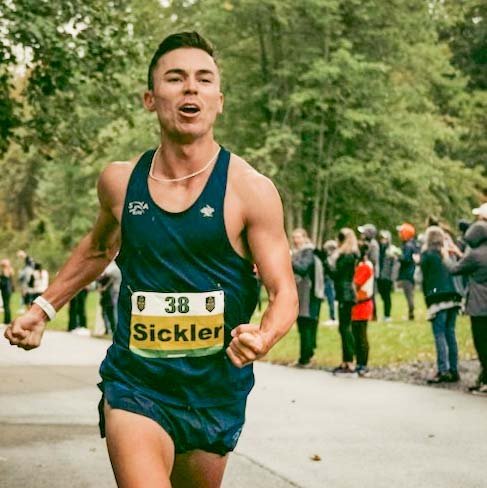Olympic Trials Qualifier Tyler Sickler Emerges as a Top Marathoner

Image by Lauren Nemeroff @L_Nemeroff
As the Olympic Marathon Trials draw closer, running fans everywhere sweat in anticipation, nearly as much as competing athletes sweat on the treadmills in their heated garages in preparation. Tyler Sickler of the Sacramento Running Association (SRA) has exceeded the demanding 2:18 standard and will join his teammates in Orlando on Feb. 3.
Growing up among the golden slopes of Vacaville, Sickler started running in middle school after realizing he was “too small to push anybody around” in sports like flag football. “I was always willing to run more than my teammates,” said Sickler. This turned out to be quite the understatement.
Sickler attended Will C. Wood High, where he ran from 2008-2013. His talent obvious, he proved the best runner on his team as a freshman. His coach, Cheyne Inman believed in high-volume training and Sickler ran 60-70 miles a week his sophomore year. By his junior and senior years, 100-mile weeks became more of the norm.
He thrived off the intensity and ran in the low 15:40s at both Lagoon Valley (3-mile) and Willow Hills (5k), some of the toughest cross-country courses in Northern California. Sickler even tested the waters with a half marathon road race, where he clocked a 1:13 (5:35/mile) and placed fourth as a high school junior.
Sacramento State University recruited Sickler after he graduated in 2013. To preserve eligibility, he decided to redshirt his freshman year.
But things quickly went off track, and Sickler sustained a stress fracture during his sophomore year. Additionally, Sickler didn’t feel the coach-athlete harmony he experienced with his earlier mentor, Inman. “There was a very heavy stress on performance,” said Sickler. His coaches encouraged Sickler to run through his injuries and they worsened.
Sickler made the hard decision to quit his college team. “The way I was looking at running wasn’t healthy,” said Sickler. “It was too big a piece of my life and I was neglecting other areas–career, education, friendships.”
Sickler eventually rejoined the Sac State team under new coaching. During his years with the team he won the Causeway Classic 3k against rival UC Davis and had some other strong performances. Still he felt underwhelmed by his college performances when he graduated in 2018. “There was always that thought in my head that I could do something better down the road,” said Sickler.
Reflecting on his college experience, Sickler contemplated how things could improve in NCAA athletics. “A lot of athletes will do whatever they can to free up time for training,” said Sickler. “Then they graduate and it’s like, ‘okay, what do I do now?’ …I feel like there’s real-world stuff they could do–helping with job applications, understanding mental health, work/school/training balance. None of these skills were taught at all.”
Unlike many others, Sickler continued to compete after college. He joined the San Francisco-based West Valley Track Club shortly after graduating from college, but found his long-term situation with SRA in Sacramento. He also reunited with Inman, his coach from high school.
Sickler credits Inman’s positivity in helping him bolster his own self-talk during races and workouts. “If you can believe in your coach, do the training, and find results–why find another coach?” said Sickler.
Recently, the 28-year-old runner’s training has fully focused on the marathon. Over the course of 2023, Sickler zeroed in on achieving the Olympic Trials standard. An audacious goal, considering his personal best stood at 2:23 in late 2022. Shaking five minutes from an already quick marathon time is no simple task. And Sickler had one year to make it happen. He set his eyes on Grandma’s Marathon, a quick summer race in seasonally temperate Duluth, Minnesota.
In the eight weeks leading up to Grandma’s, Sickler ran an average of 104 miles and peaked at 130 miles. Inman would have Sickler build for three weeks, then relax a bit for the fourth. In a typical week, Sickler would only have one workout day. But he would have two workouts that day. The idea was to fit as many miles near marathon goal effort into one day as possible. “It’s a huge confidence-booster to work out twice a day and have the one in the afternoon go well,” said Sickler.
But marathon training isn’t all barbershop quartet harmonies. “In the marathon, you can’t just show up and rely on your talent,” said Sickler. “…The biggest thing I have going for me is discipline.” He acknowledged how boring marathon training can be, and how necessary it is to have an audiobook or podcast episode lined up to endure the umpteenth easy 10-miler in any given week. “Most runs you feel sore,” said Sickler. You’re just kind of used to feeling like crap, and you have to hope that… it’s all going to come together in the end.”
Things looked promising as the marathon approached. During the build, Sickler ran the 2023 Eugene Half Marathon where he shocked himself with a time of 1:05:49 (5:01/mile). He headed to Duluth prepared to try for the Trials standard.
Sickler came close to his goal at Grandma’s Marathon. Running a slightly conservative first half in 1:09:24, Sickler had too much time to make up and finished in 2:18:21 (5:17/mile)–Just a hair short of the 2:18 Olympic Trials standard (5:16/mile). “It was bittersweet,” said Sickler. He had dropped five minutes from his best marathon time in about six months. An incredible jump, but one that fell short of his ambitious goal.
Undeterred, Sickler prepared for a follow-up marathon effort. A small race in New York gave all Olympic Trials hopefuls a last-ditch attempt at the standard on a fast, looped course. Sickler booked his flight. The McKirdy MicroMarathon in Rockland Lake State Park, slated for Oct. 14, 2023, quickly thrust Sickler back into the grind of training.
While being a student provided the comfort of reliable training partners, Sickler finds that post-college running can be lonely. “Everyone has a life and a job,” said Sickler. “It’s hard to meet up with people.” Sickler fell into his familiar, grueling routine. He compiled double workouts and heaps of miles, hitting 141 miles in a single week.
Finally, race day came and Sickler shouted triumphantly as he bolted across the finish line in 2:16:57 (5:10/mile). A huge success, the event saw 34 other men and 13 women achieve the Olympic Trials standard (sub 2:37, 5:59/mile for women).
Now a full-time biology teacher at Bella Vista High School in Sacramento, Sickler prepares to run the streets of Orlando with the best marathoners in the country–including teammates Shadrack Biwott and Grayson Hough.
Tune in to watch for SRA runners at the Olympic Marathon Trials on Feb. 3, airing live on Peacock (7 a.m. PST) or later on NBC (9 a.m. PST).
Written by Garrett Gardner

